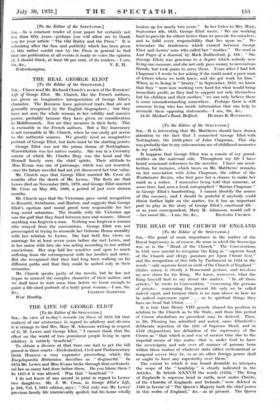• THE REAL GEORGE ELIOT [To the ' Editor of the
SPECTATOR.] SIR,—I have red Mr. Richard Church's review of the Romieus' Life of George Eliot. Mr. Church, like the French authors, has given an imaginative interpretation of George Eliot's character. The Romieus haVe perceived traits that are not generally recognized by the English biographers ; but they have not seen the whole woman in her solidity and massive, power, probably because they have given no consideration' to Middlemarch. Nor are they accurate in their facts. This is excusable in the French authors. But a like inaccuracy is not excusable in Mr. Church, when he can easily get access to the authentic sources. We greatly need an imaginative portrait of George Eliot, but facts must be the starting points.
George Eliot was not the prima donna of Nottingham. Warwickshire was her native county. She was in a Coventry coterie of which Mr. Charles Bray was the head and the Hennell family were the chief spirits. Their attitude to Miss Evans was one of patronage, which was not resented, since the future novelist had not yet discovered her true value.
Mr. Church says that George Eliot married Mr. Cross six months after the death of Mr. Lewes. The facts are that Lewes died on November 28th, 1878, and George Eliot married Mr. Cross on May 6th, 1880, a period of just over sixteen months.
Mr. Church says that the Victorians gave social recognition to Rossetti, Swinburne, and Burton, and suggests that George Eliot's egotism and moral greed were responsible for her long social ostracism. The trouble with the Victorian age was the gulf that they fixed between men and women. Almost anything was forgiven a man. Nothing was forgiven a woman who strayed from the conventions. George Eliot was not preoccupied in trying to reconcile her Osborne House morality with her relation to Lewes. She had held free views on marriage for at least seven years before she met Lewes, and in her union with him she was acting according to her settled convictions. Her step laid her sensitive soul open to much suffering from the estrangement with her brother and sister. But she recognised that they had long been walking on far different paths and that they could be united only in their memories.
Mr. Church speaks justly of the novels, but he has not began to unravel the complex character of their author, and we shall have to wait some time before we know enough to paint a life-sized portrait of a truly great woman.—I am, Sir,






























 Previous page
Previous page